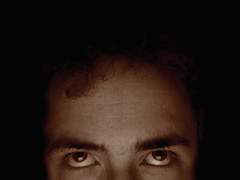The Pardon
by Richard Wilbur
My dog lay dead five days without a grave
In the thick of summer, hid in a clump of pine
And a jungle of grass and honeysuckle-vine.
I who had loved him while he kept alive
Went only close enough to where he was
To sniff the heavy honeysuckle-smell
Twined with another odour heavier still
And hear the flies' intolerable buzz.
Well, I was ten and very much afraid.
In my kind world the dead were out of range
And I could not forgive the sad or strange
In beast or man. My father took the spade
And buried him. Last night I saw the grass
Slowly divide (it was the same scene
But now it glowed a fierce and mortal green)
And saw the dog emerging. I confess
I felt afraid again, but still he came
In the carnal sun, clothed in a hymn of flies,
And death was breeding in his lively eyes.
I started in to cry and call his name,
asking forgiveness of his tongueless head.
...I dreamt the past was never past redeeming:
But whether this was false or honest dreaming
I beg death's pardon now. And mourn the dead.
Richard Wilbur's The Pardon really affected me because of the intimacy it's able to get with death--often a much euphemized subject. He talks of the heavy odor, the flies, a tongueless head.
And it's strange that in asking forgiveness, Wilbur focuses more on the neglect--leaving the dog in the thick of summer for five days--than on the merits of the dog.
Also, he's able to tell us all of this while adhering to a sonnet-like form. I think rhyming in poetry suggests a greater degree of mastery.
Uh, thanks,
Corey

